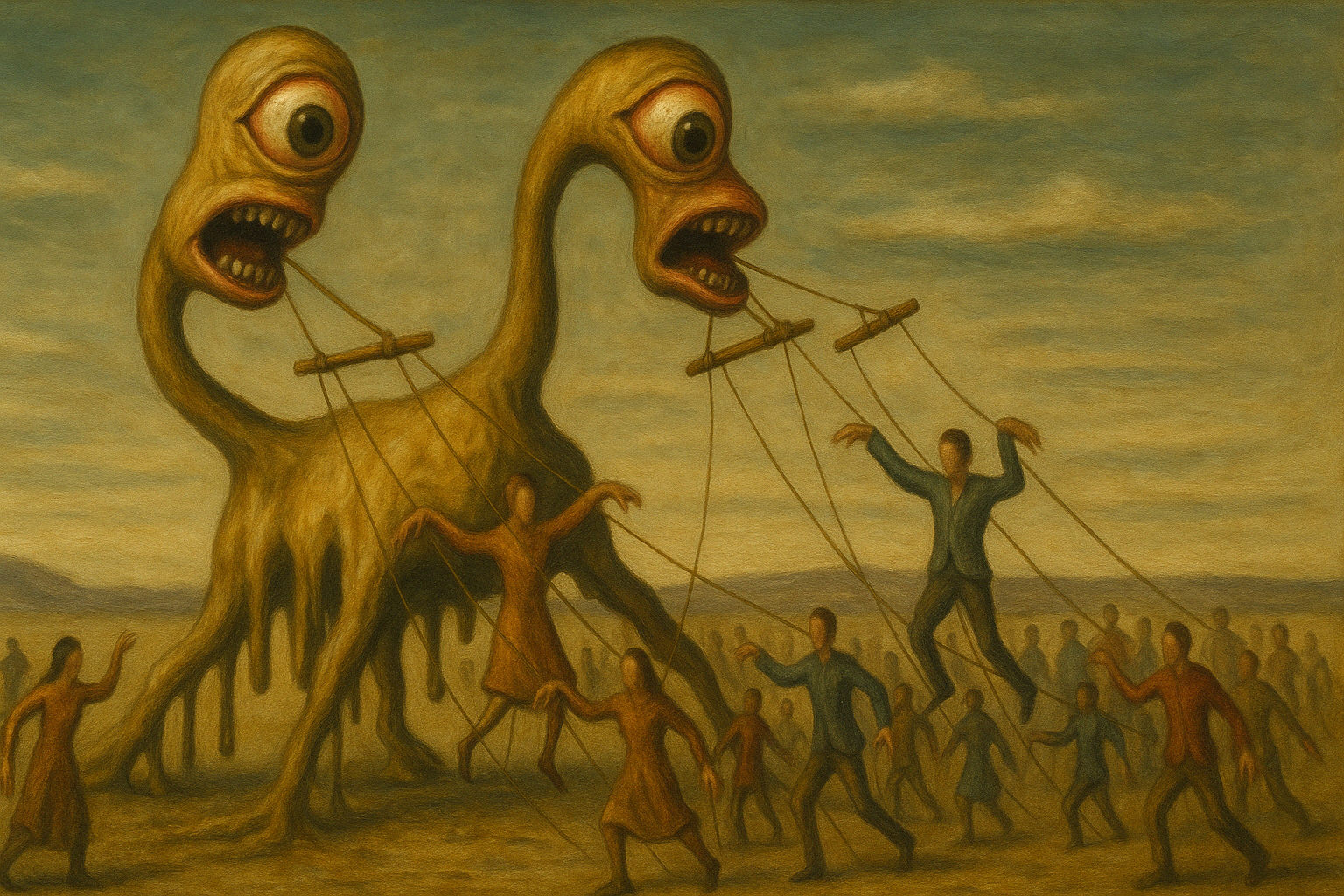The Puppeteer Virus: A Multidimensional Framework for Understanding Behavioural Manipulation and Social Contagion
Abstract
This article introduces the concept of the puppeteer virus, a metaphorical framework that explores how various forces—biological, psychological, social, and ideological—can exert manipulative control over human cognition, behaviour, and interpersonal dynamics. Drawing inspiration from parasitology, psychoneuroimmunology, and social psychology, the framework describes how such forces can ripple outward from individuals to influence broader social structures. One variant of this phenomenon is grounded in biological mechanisms, including chronic infections and neuroinflammation, which can shape behavioural expression. However, the puppeteer virus metaphor extends beyond physiology to encompass other high-impact societal examples such as addiction, mass hysteria, ideological extremism, and interpersonal psychological manipulation. By mapping these diverse yet parallel manifestations, the model offers a unified lens for understanding how internal or external agents can override individual autonomy and alter collective behaviour.
Introduction
Human behaviour is shaped by a complex interplay of internal states and external forces. In recent years, researchers have increasingly recognized that disruptions in physiological, psychological, or social systems can have far-reaching effects on cognition, emotional regulation, and interpersonal dynamics. The puppeteer virus is a conceptual and metaphorical framework that captures this phenomenon: the idea that certain forces can “pull the strings” of individuals, subtly or overtly influencing their actions and, by extension, the social fabric around them.
This framework is rooted in diverse disciplines, from parasitology to political psychology. In its biological dimension, the metaphor draws on examples such as Toxoplasma gondii, rabies, and neuroinflammatory conditions, which directly alter brain function and host behaviour. However, biology represents only one of multiple domains through which the puppeteer virus may operate.
Other manifestations include:
- Addiction, where the compulsive pursuit of a substance reshapes the behaviour of not only the individual but their entire social network;
- Mass hysteria and collective delusions, where social contagion can override rational decision-making on a large scale;
- Ideological extremism, which can hijack belief systems and drive individuals to act against their own self-interest or communal well-being;
- Psychological manipulation, particularly by individuals with narcissistic or sociopathic tendencies, who may control others in ways that compromise autonomy and agency.
Together, these diverse cases demonstrate how the puppeteer virus, as a metaphor, captures an overarching pattern: internal or external agents co-opt the individual mind to influence group behaviour. In the sections that follow, we explore this concept in detail—beginning with its biological foundations and expanding into its psychological and societal implications.
Biological Pathways of Puppeteer Influence
The biological variant of the puppeteer virus concept focuses on the physiological processes through which pathogens, immune signaling, and neuroinflammation can alter human cognition and behaviour. These alterations can initiate changes that ripple through social interactions and networks.
Infectious Agents and Behavioural Manipulation
In nature, behavioural control by parasites is well-documented. Toxoplasma gondii reduces rodents’ fear of predators, enhancing its own life cycle. In humans, latent T. gondii infection has been associated with increased impulsivity and psychiatric conditions (Flegr, 2007). Rabies virus, by inducing aggression, increases the likelihood of transmission.
These phenomena suggest that pathogens can serve as biological puppeteers, manipulating host behaviour to their own ends—a mechanism with striking parallels to other non-biological manipulations explored in later sections.
Neuroinflammation and Immune Modulation of Behaviour
Chronic inflammation has been shown to influence brain function by disrupting neurotransmitter systems and activating brain-resident immune cells, leading to symptoms like anhedonia, fatigue, and irritability (Dantzer et al., 2008). These symptoms can subtly reconfigure social behaviours and interpersonal dynamics, suggesting that immune system disruptions can act as behavioural vectors—unseen strings on the social marionette.
Psychosocial Puppeteers: Addiction, Ideology, and Manipulation
Beyond biological mechanisms, the puppeteer virus metaphor encompasses a spectrum of psychological and sociocultural forces that can manipulate individuals and propagate behavioural influence through social systems.
Addiction as a Behavioural Puppet Master
Substance addiction provides a vivid example of non-pathogenic behavioural control. The addictive agent—whether chemical or behavioural—becomes a central organizing force in the person’s life, often distorting priorities, perception, and relational dynamics. Family members may become enablers, roles shift, and entire households reorganize around the addiction’s gravitational pull.
In this way, addiction functions like a puppeteer: it rewires internal reward systems and external relationships to perpetuate its own cycle.
Mass Hysteria and Collective Delusion
Episodes of mass psychogenic illness and social panics show how contagious emotional and behavioural patterns can hijack group dynamics. Historical cases, such as the Salem witch trials or 20th-century moral panics, demonstrate how groups can be manipulated en masse into irrational behaviour. Social media accelerates these effects, allowing belief-based “viruses” to spread with unprecedented speed and reach.
Ideological Extremism and the Hijacking of Cognition
Ideologies—particularly rigid or totalizing ones—can act as puppeteer viruses by installing a cognitive framework that filters perception, governs judgement, and justifies extreme behaviour. Extremist belief systems often override personal interests or moral instincts, motivating individuals to isolate themselves, engage in violence, or accept authoritarian control. These behaviours resemble parasitic strategies—recruitment, replication, suppression of dissent—reframed as cultural and cognitive phenomena.
Interpersonal Psychological Manipulation
Manipulative individuals, such as those with narcissistic or antisocial traits, may exert puppeteer-like control over their social environments. Through gaslighting, coercion, and emotional entrapment, such individuals create dependency and alter the behaviours of those around them. Like a virus, this form of manipulation spreads its impact indirectly by influencing the influencers—ensnaring entire relational webs.
Psychoneuroimmunology and Cross-Domain Integration
Psychoneuroimmunology (PNI) serves as a bridge between the biological and psychological dimensions of the puppeteer virus concept. It examines how immune responses affect brain function and, by extension, emotion and behaviour.
Cytokines such as IL-6 and TNF-α have been shown to influence brain regions involved in social cognition and emotional processing (Capuron & Miller, 2011). Inflammation can alter perception, induce hypervigilance, and reduce social engagement. These changes may resemble the psychological manipulations found in addiction or extremism—differing in cause but converging in behavioural outcome.
This systems view of brain-immune-social interactions enables a holistic understanding of how the puppeteer virus may operate on multiple levels simultaneously: from microbial to ideological.
Implications and Applications
Clinical Relevance
Viewing behavioural symptoms through the puppeteer virus lens may help clinicians address issues like addiction, depression, and manipulation-related trauma with greater nuance. Recognizing the externalized or systemic nature of these symptoms reduces blame and opens new avenues for intervention.
Social Policy and Prevention
Mass behaviour events—whether from ideology, addiction, or illness—can disrupt societies. Understanding the puppeteer virus as a model for social contagion offers tools for anticipating and mitigating cascading dysfunctions, especially in public health and online environments.
Research and Future Directions
This multidimensional metaphor invites interdisciplinary research. Questions for future investigation include:
- How do behavioural contagions differ across biological, psychological, and ideological domains?
- What are the neuroimmune biomarkers of social susceptibility?
- Can interventions designed for one “dimension” of the puppeteer virus (e.g., biological) influence another (e.g., ideological extremism)?
Conclusion
The puppeteer virus offers a flexible, multidimensional framework for understanding how individuals and social systems are shaped—and sometimes hijacked—by powerful internal and external forces. From microbes to memes, from cytokines to cults, the metaphor underscores a common pattern: manipulation of the individual mind in service of a self-replicating agent. Recognizing this pattern across domains allows for deeper insight, improved interventions, and greater resilience in the face of behavioural contagion.

